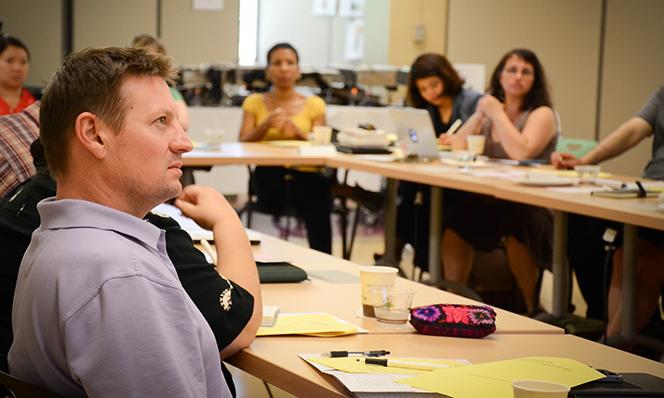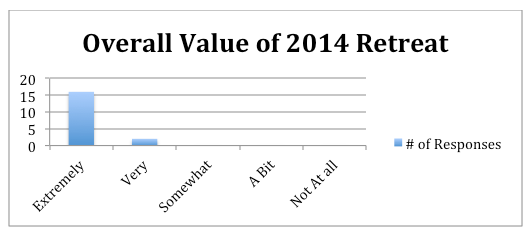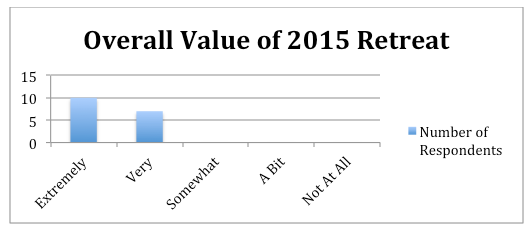by: Caitlin Holmes
Caitlin Holmes is the Assistant Director of Writing Across the Curriculum at George Mason University. She blogs regularly about teaching here at thewritingcampus.com. You can reach her via email at [email protected].
With the support of Mason’s Provost Office and Center for Teaching and Faculty Excellence, the Writing Across the Curriculum Program hosted two Faculty Writing Retreats in the past 12 months: one in May 2014 and the other in January 2015. Such retreats had occurred in the past under the supervision of the Northern Virginia Writing Project, but not for quite some time. This blog post will review the different structures of the May 2014 and January 2015 retreats, give summaries of evaluation results for both retreats, and provide a few concluding thoughts about what we may try in the future at Mason.
It is important to acknowledge why Faculty Writing Retreats are an important development in the first place. Mason’s faculty culture is – as with all institutions – unique. With our campuses located in the Washington DC metro area (from Manassas to Arlington, Fairfax to Loudon), many faculty members commute long distances to campus or are only on campus a few days a week. Community amongst faculty is consequently not as strong as it might be in a smaller city or more isolated college town. As a result, independent writing groups are less likely to develop given the geography and institutional culture of Mason. Additionally, tenure requirements for faculty at Mason are generally increasing, making independent writing time all the more important for successful tenure cases. This particular milieu of faculty needs, university requirements, and institutional culture makes Mason an excellent place to experiment with the structure and implementation of faculty writing retreats.
May 2014 Retreat
The May 2014 retreat took place over 4 days after the end of the semester. Faculty met daily and separated into a variety of self-selected groups (“Shut Up and Write,” “Goal Setting, then Shut Up and Write,” and a draft discussion workshop), coming back together for discussion and workshops at lunch. There were a total of 18 respondents to the end-of-retreat evaluation form.
Respondents’ comments offered an interesting way of thinking about how faculty writing retreats function within the university community. For example, one participant wrote, “I am really surprised by how valuable this experience has been. I expected to get undisturbed time to write but did not anticipate the value of the group setting and discussions. I learned more about time management than I expected to and it was especially useful to learn that my challenges were shared by others. The small group was a safe space to discuss this.” Shared writing experiences consequently led to shared institutional experiences. As another participant put it, “We really need this culture, need this community. It helps us to feel we are not working alone.”
Faculty were also quite productive during the sessions, with a substantial number of them writing over 4,000 new words and revising an equal or greater amount.
Participants’ comments also revealed the extent to which writing is not simply a productive process, but also one bound up in reading, analysis, formatting, and submission requirements. One respondent noted, “I was primarily editing & finishing full book MSS, so I didn’t do much writing & revising, but I did ship off 1 final monograph MS & I edited collection MS for initial review.” Another said, “The equivalent of 8 pages (?) not including several pages of notes (etc.).” Note-taking, reading, fixing tables, editing manuscripts, running data, working on indexes – all of these activities reflected the very different positions and disciplinary expectations for writing production.
The evaluation form invited respondents to suggest future workshops or other ways to support their writing. Their suggestions display a variety of concerns about academic writing. For example, one participant wrote that she would be interested in discussing “[f]inding a mentor at GMU (not in my dept.), gender issues (why are we almost all women?), more specific topic on productivity for tenure (esp. for article disciplines), writing quantitative pieces (where half time is writing + half time or more is figuring out stats/software/tables), balancing quality vs. quantity.” These areas of discussion all offer potential opportunities for faculty workshops in addition to possible research for writing scholars.
January 2015 Retreat
The January retreat was much shorter than the spring retreat – only 2 days. Faculty were once again divided into 4 self-selected groups (2 “Shut Up and Write,” 1 “Goal Setting, then Shut Up and Write,” and 1 draft discussion workshop), with conversation during lunch. There were 22 participants and 17 total respondents to the evaluation form.
Respondents’ comments also offered feedback about what they appreciated most about the retreat. Again, the sense of community amongst writers emerged as a top reason why faculty liked the event so much. Participants wrote, “It’s so invigorating to chat w/ others who value writing and hear/learn about all the wonderful projects going on at Mason. I feel I can talk (more informed) about the dept. level activities going on better than I could before this.” Also, “The highlight is really the sense of community and the dedicated time to work.” In fact, one respondent felt like she might have needed more community in writing than she originally thought: “I think that even though I had joined the ‘shut up & write’ group, I might have enjoyed more frequent check-ins after all.”
Faculty were, again, quite productive during the 2 days:
Comments regarding the sort of writing projects were also similar to those from the May 2014: “My time was spent organizing & framing large quantities of material,” “Several pages + 3 diagrams (1000 words = 1 diagram),” “5 tables designed + completed + 6 subsections (total words, 2,317).” One participant noticed that the writing work conducted actually led to more writing opportunities in the future: “My work focused more on finding the narrative for my article and this involved much more data processing than I anticipated. As a bonus: I have 5 new ideas for other research projects. So it wasn’t wasted time.”
Having the retreat at the start of the semester rather than the start of summer changed the dynamics of the event. Faculty had to take time away from course preparation, which led to some fascinating comments in terms of writing in the classroom. In addition to workshops on book publishing, tenure requirements, and writing strategies, respondents suggested the following:
- A workshop on how to help grad students w/ their writing would be great. As an [engineering] prof. I haven’t bc [sic] taught how to teach others to write and I find this really challenging.
- Writing in higher education/teaching journals
- Helping graduate students developing as writers[,] providing feedback on thesis/dissertations + habits helpful to students growing as writers
Faculty made connections between their own development as writers and their positions as teachers and mentors of developing scholars. That faculty were interested in writing for pedagogy journals was also an interesting development.
Overall Conclusions
Mason WAC hopes to host another writing retreat this coming May, and we hope to implement a few changes to enhance the experience for faculty participants. First, we would like to experiment with the experience outside of the actual writing space. Respondents suggested that an opportunity for a walk or yoga might be useful and relaxing as a break from writing. With repeated comments about difficulties managing stress as tenure-track faculty, such opportunities would help participants when the pressure becomes too much. Others suggested getting away from campus entirely. Second, we are considering breakaway workshops on particular types of writing, such as grant writing, book publishing, and supporting graduate student writers.
These 2 retreats raised questions about the different needs that they may have in successfully completing that research. Time and space were, naturally, the two needs that respondents identified most frequently as key to their success. That there were benefits other than productivity – such as figuring out more about how the university, tenure, writing, and teaching work; finding a sense of community and support amongst other writers; and thinking about writing pedagogy as an extension of personal writing – invites further study about the relationship between faculty professional development and its impact on student writing, especially in disciplines outside of rhetoric and composition where writing pedagogy is not featured as centrally in graduate coursework.
Mason WAC would like to extend sincere thanks to Mason’s Provost’s Office, the Center for Teaching and Faculty Excellence, and our faculty participants for supporting these retreats, and we hope to have more like it in the future!





